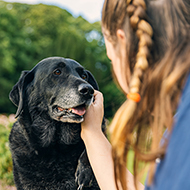
Just five per cent of prospective buyers are looking for a dog aged eight or over.
Dogs Trust has launched a new campaign to persuade people looking to buy a new dog to consider rehoming an older animal, following the sharp rise in demand for puppies during the pandemic.
The charity found that, in the past nine months, nearly half of all people looking to adopt were searching for a dog under six months old, while just five per cent were looking for a dog aged eight or over.
In addition, Google searches for ‘buying a puppy’ increased by 213 per cent after the beginning of the first lockdown last year compared to the previous twelve months.
Adam Clowes, operations director at Dogs Trust said: “In the last year so many people have wanted to welcome a puppy into their family, but older dogs make fantastic companions too.
“Helping an older dog enjoy their autumnal years and giving them the chance to live their best life is incredibly rewarding. Owners always tell us that the feeling you get from seeing them safe, warm, happy and enjoying an afternoon snooze snuggled up on the sofa, is something that can’t be beaten.”
Of the more than 300 dogs currently ready for rehoming at Dogs Trust, 22 per cent are aged eight or over.
The charity is encouraging potential puppy owners to give an older rescue dog a second chance, as they usually know the training basics and are much easier to predict in terms of personality and behaviour.
“Older dogs are often calmer and less energetic,” Mr Clowes added, “so although they may still be playful and enjoy a stroll in the park, hiking up hills may be a thing of the past for them, which suits some owners, young and not so young.”



 The Veterinary Medicines Directorate (VMD) is inviting applications from veterinary students to attend a one-week extramural studies (EMS) placement in July 2026.
The Veterinary Medicines Directorate (VMD) is inviting applications from veterinary students to attend a one-week extramural studies (EMS) placement in July 2026.